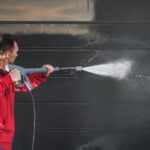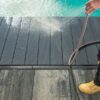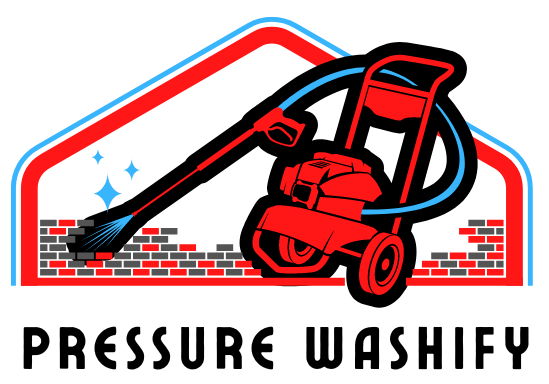Affiliate Disclaimer: This post may contain affiliate links, meaning we get a commission if you decide to make a purchase through our links, at no extra cost to you.
Cleaning a swimming pool is an essential task that helps maintain your pool’s health, beauty, and overall lifespan. But here’s the rub: many pool owners wonder, can you pressure wash a pool with water in it? There’s a common misconception that the pool needs to be drained for you to pressure wash it.
The good news is that, yes, you absolutely can pressure wash a pool even if it’s full of water!
And if your pressure washer accidentally falls in the pool, you can read our detailed guide to prepare for this situation.
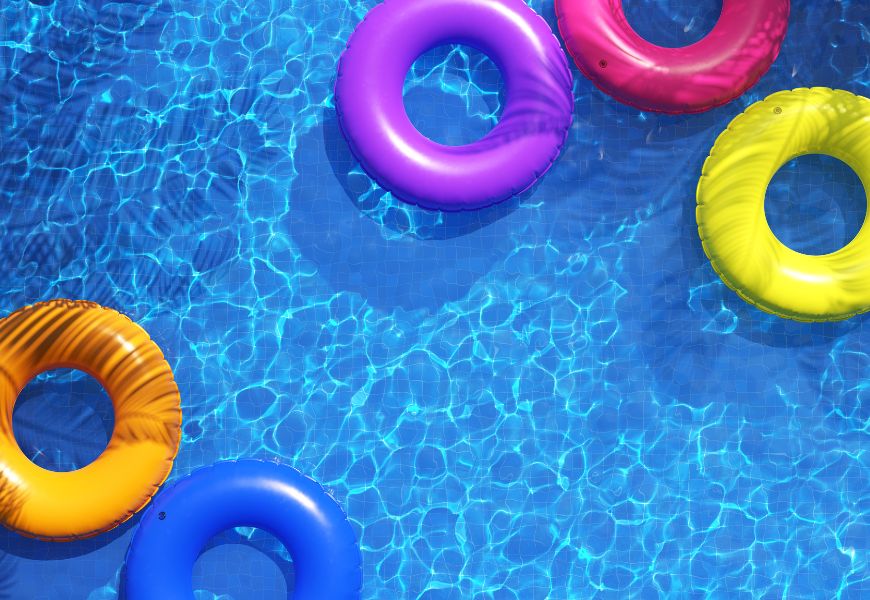
Why you should pressure wash a pool with water in it?
- Deep, fast cleaning: Cuts through years of dirt, grime, and algae in hours—not days.
- Saves water: No need to drain and refill the pool, saving thousands of gallons.
- Time-efficient: Finish the job in a few hours instead of spending days scrubbing.
- Long-lasting results: Removes algae and buildup at the source, keeping the pool cleaner longer.
What you need?
Here’s a straightforward list of what you will need:
- Pressure washer: Pick one you can handle easily and that has enough power to clean pool surfaces.
- Protective gear: Wear safety glasses, gloves, sturdy shoes, long sleeves, and pants to avoid injuries.
- Pool brush: Use it for tough stains the washer can’t handle.
- Telescoping wand: Helps you reach deep spots and tall pool walls.
- Pool skimmer: Scoop out leaves, twigs, and large debris.
- Pool vacuum: Clean up fine debris for clear water.
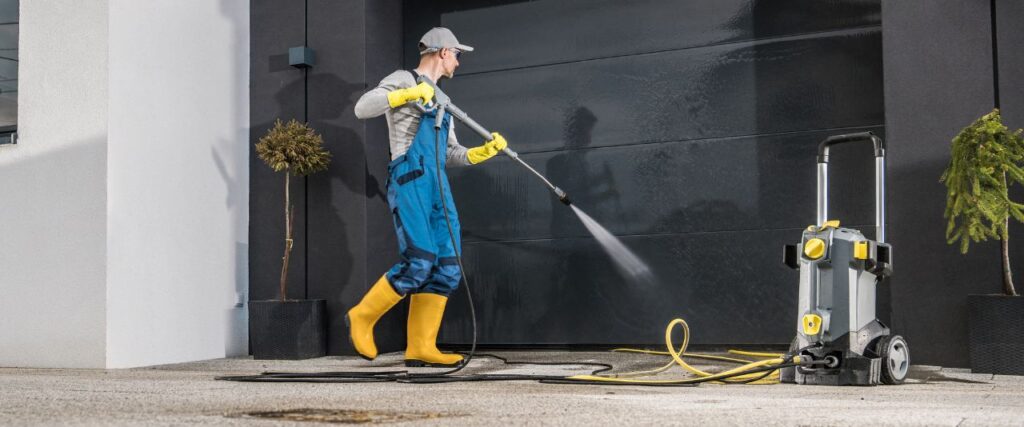
Step-by-Step Guide to Pressure Washing a Pool with Water in it
Step 1: Preparing the Pool and Surroundings
Remove large debris like leaves, sticks, or toys from the pool. Also, cover surrounding plants or items that could be damaged by the pressure washer spray.
Step 2: Setting up the Pressure Washer
Next is setting up your pressure washer according to its manual. Make sure to wear your protective gear before you start this – safety goggles, gloves, and waterproof boots are a must.
Step 3: Cleaning the Pool
- Start spraying from the top of the pool walls and move downward.
- This prevents dirt and algae from running over already-cleaned areas.
- The high-pressure water detaches grime, and pool water helps carry it away.
- Clean the pool floor thoroughly, too—don’t skip it.
- Focus on stubborn stains or algae spots; you may need multiple passes to fully clean them.
Step 4: Scrubbing the Stubborn Stains with a Pool Brush
Although pressure washing will clean up most of the dirt and grime on your pool, there could be a few stubborn stains it might not be able to remove. The best way to deal with these stains is with a good old-fashioned pool brush and some elbow grease.
Always use a good quality pool brush like the Sepetral Pool Brush Head (Pole sold separately) to ensure that the bristles don’t break away and contaminate the water in your pool.
Step 4: Post-Cleaning Actions
Use your pool skimmer to remove any remaining large debris. Then, if available, use a pool vacuum to clean up the smaller debris and dirt that has settled at the bottom of the pool.
Finally, check the pool’s water chemistry. Pressure washing might disturb the balance of your pool’s water. Adjust the levels of chlorine, pH, alkalinity, and hardness as needed to ensure the water is safe for swimming. Use a good quality pH balancer like HTH 67041 to balance your pool’s water chemistry.
HTH 67041 pH Up Swimming Pool Chemical Balancer

- Maintains Alkalinity & pH
- Corrosion Protection
- Prevents Skin & Eye Irritation
- Enhances Chlorine Effectiveness
Frequently Asked Questions
1. Do I need a professional to pressure wash my pool?
Not necessarily. You can pressure wash your pool yourself, given that you have the necessary equipment and safety gear. It requires a bit of effort and time, but follow the steps provided in this blog post and you’ll have no problem.
2. Can pressure washing damage my pool?
If done correctly, pressure washing should not harm your pool. However, improper use of a pressure washer could potentially damage the pool surface. Remember to start with a low pressure and increase it gradually as needed.
3. How often should I pressure wash my pool?
The frequency of pressure washing can depend on several factors such as the number of people using the pool, the amount of debris it is exposed to, and the local weather conditions. On average, pressure washing once a year can keep your pool looking clean and well-maintained.
4. Do I need any special kind of pressure washer?
A standard pressure washer should suffice for most pool cleaning tasks. However, if your pool is larger than average or has a lot of stubborn stains, you might want to consider a professional-grade pressure washer.
5. What do I do if my pressure washer falls in the pool?
Immediately cut off its power and try to retrieve it with a long handle pool net. Read our blog post for a detailed guide.




